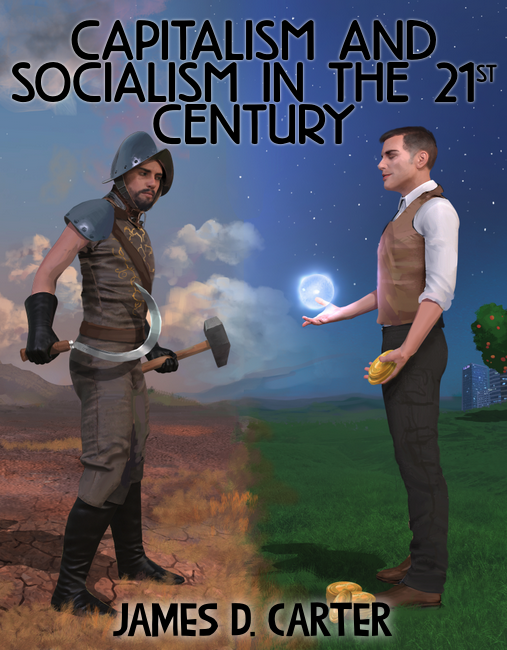





By: James D. Carter
Economic activity, though familiar and commonplace, cannot be fully understood unless it is placed in its proper social, historical, and evolutionary context. A key part of this context is the basic patterns and principles of human nature, from which the idiosyncratic patterns and principles of economic, social, cultural, and political activity in human socioeconomic systems spring. To understand economic activity means to understand human motivation and the forces that shape it, and doing this requires that we subordinate our desire to be special so that we may understand what is common, what is shared - what is foundational - in all of us.
This book, Capitalism and Socialism in the 21st Century, discusses the key differences between capitalism, socialism, anarchism, and syndicalism in light of the basic principles and patterns of human nature, and then provides numerous real-world examples and commentary to illustrate the essential differences between these four different socioeconomic systems. The real-world examples range from the historical to the modern, including some from the 21st century. However, this book is not primarily concerned with the historical details, but with the deeper ideas and general principles, and the examples are used to illustrate the validity and applicability of these ideas and principles. The book also discusses the underpinnings of economic and social behavior in the human psyche by way of additional examples, and it includes discussion of various claims made about capitalism and socialism (which are the two primary systems discussed in this book) that make reference to supposed inherent components of these systems - such as the idea that capitalism is inherently racist or sexist, or the idea that socialism is inherently democratic - in light of the essential principles of these socioeconomic systems spelled out earlier in the book.
This book contains the following:
We also discuss in this part the psycho-emotional foundations of extremism.
Subsequently, we discuss the psychological underpinnings of the socialist mindset in a more direct way, and then conclude the main body of work in the final section.
There is a long history of scholarly work on the ideas of human social and economic organization. But society changes as time passes, and it is important for the purpose of preserving and extending freedom to show that these ideas and writings are still relevant, and, in fact, that they are just as relevant as they have always been. A thorough expression, and, in various ways, reiterpretation, of these ideas in the context of both historical and modern societies, and also in the context of a deeper analysis of human nature and its source - biological evolution - not only provides a unique perspective on these ideas, but provides insight and clarity which can translate into actionable beneficial changes in individual and societal behavior.
The world in which we live is a combination of circumstances beyond our control and circumstances we can control. A substantial portion of our evolutionary heritage, including specifically those genes which code for the basic emotional and psychological idiosyncrasies that we collectively call human nature, consists of things given to us that we cannot control, cannot undo, cannot refuse. On the other hand, our free will and rational capacity, which is also given to us by the evolutionary process, allows us to control and influence the world around us, including the behavior of others, as well as our own behavior. It is the latter which allows us the ability to take creative action to solve problems in order to make things better for ourselves and for society, but we must solve these problems in the context of those things which we cannot control or influence. This means that to understand how to solve our problems, both as individuals and as a global society, we must understand the idiosyncrasies of human nature; only then can we find realistic, and thus lasting, solutions.